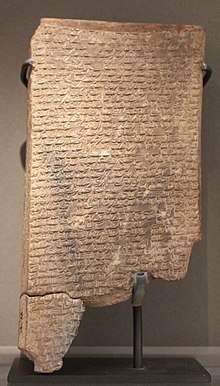Ludlul bēl nēmeqi
Ludlul bēl nēmeqi ("I Will Praise the Lord of Wisdom"), also sometimes known in English as The Poem of the Righteous Sufferer, is a Mesopotamian poem (ANET, pp. 434–437) written in Akkadian that concerns itself with the problem of the unjust suffering of an afflicted man, named Shubshi-meshre-Shakkan. The author is tormented, but he doesn't know why. He has been faithful in all of his duties to the gods. He speculates that perhaps what is good to man is evil to the gods and vice versa. He is ultimately delivered from his sufferings.[1]

The poem was written on four tablets in its canonical form and consisted of 480 lines. Alternate names for the poem include the Poem of the Righteous Sufferer or the Babylonian Job.[2] According to William Moran, the work is a hymn of thanksgiving to Marduk for recovery from illness.[3]
The first (but now outdated) edition of the poem was published by W. G. Lambert in 1960 (reprinted in 1996).[4] Amar Annus and Alan Lenzi have edited in 2010 a new edition of the poem for the Neo-Assyrian Text Corpus Project. This volume was published as State Archive of Assyria Cuneiform Text 7 (SAACT 7).[5] The new edition includes tablets published by Wiseman,[6] George and Al-Rawi,[7] Horowitz and Lambert,[8] and several other unpublished tablets from the British Museum.[9]
See also
References
- John L. McKenzie, Dictionary of the Bible, Simon & Schuster, 1965 p. 440.
- Gilbert, “Wisdom Literature”, Jewish Writings of the Second Temple Period (Uitgeverij: Van Gorcum, 1984), p. 284.
- William L. Moran, "Notes on the Hymn to Marduk in Ludlul Bel Nemeqi," in Journal of the American Oriental Society, Vol. 103, No. 1, Studies in Literature from the Ancient Near East, by Members of the American Oriental Society, Dedicated to Samuel Noah Kramer (Jan. - Mar., 1983), pp. 255-260.
- W. G. Lambert, Babylonian Wisdom Literature (Winona Lake: Eisenbrauns, 1996), pp. 21-62 and 282-302.
- Ludlul bēl Nēmeqi. The Standard Babylonian Poem of the Righteous Sufferer
- D. J. Wiseman, "A New Text of the Babylonian Poem of the Righteous Sufferer" in Anatolian Studies, Vol. 30 (1980), pp. 101-107.
- A. R. George and F. N. H. Al-Rawi, "Tablets from the Sippar Library. VII. Three Wisdom Texts" in Iraq, Vol. 60 (1990), pp. 187-206.
- W. Horowitz and W. G. Lambert, "A New Exemplar of Ludlul Bēl Nēmeqi Tablet I from Birmingham," in Iraq, Vol. 64 (2002), pp. 237-245.
- See the edition's page at Eisenbrauns, the exclusive North American distributor.